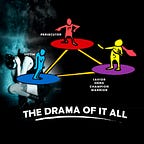There is advice about cultivating a mindset out there that will make you feel extremely powerful in life, and many people will advise you against giving it. If you suggest that someone look for places in their life where they have control, even when they were not “at fault,” some will suggest you are “victim blaming.”
If someone drugs/rufies a woman in order to rape her, we can say she’s a “victim.” We can all agree with that. But some people, out of a weird “protective” mindset will say you’re “victim-blaming” if you say that she should be more careful about what or how she drinks in public in the future or ask why she wasn’t more careful leading up to it.
If someone accuses you of “victim blaming” when you suggest someone look for ways to protect themselves, they are taking on this sort of momma-bear “savior” role. And, just like in every other instance, if someone wants to play “savior” their advice will keep their perceived “victims” as “forever victims.” In other words, their advice will be horrible and backfire.
Those who want to play “savior” will look at you (suggesting personal responsibility) as “evil.” This is because they live with a very limited perspective, stuck in the Drama Triangle. You are either an “ally” (playing “savior” along with them), a “victim”, or a “persecutor.” If you suggest that the woman take some responsibility to protect herself in the future, they will stop thinking of you as an ally and associate you with the “persecutor” (or rapist in this case). All of a sudden, to them, you will be just as evil as the rapist.
To you, you want the woman not to feel like a victim for the rest of her life and to have a better life experience. But to them, you are harming her by “victim blaming.” When something bad happens to someone, you can simultaneously see them as a “victim” of a crime or immoral behavior and also see them as capable of taking action to better their experience in the future.
And, the most important point here is that when you take responsibility for your life, you feel empowered! If you give your responsibility away to others, you become dependent and powerless. When you say, “It should not be my responsibility to make sure I don’t drink a date-rape drug while at a bar,” you are shifting the responsibility to other people and giving away your power to those people.
If you want to feel like you are in control of your life, you will need to take personal responsibility regardless if other people are assholes. Even if you did not do anything morally wrong, you can still look for weak places that you could have done better, to build resiliency and become more empowered than you were before.
In the following old video of Louis Rossman, he explains that he attempted to call a customer back when the repair was finished (early). The customer came back weeks later complaining that Louis was keeping the repair too long and then gave him a horrible review. Everyone in the office said that Louis did what he could and the customer was wrong. Yes, the customer was wrong. But Louis knew that the best thing to do was to look for ways in which he could have made this experience go better. He ultimately figured out where his business had a weak spot and fixed it.
He wanted to have a successful business and, in order to do that, you have to look for weak points and improve those.
“I don’t want my business’ success to be based on somebody else.
I want my business’ success to be based on me.” ~Louis Rossman
If you don’t want to look for all the places in your life where you could improve and want to responsibility shift onto others, you will be forever their slave. If Louis was comfortable in saying, “The customer was an asshole,” and leaving it at that, whether or not he succeeded in business would be the responsibility of his customers, not himself. His successes (or lack thereof) would be a slave to how his customers acted, rather than how he acted. That lazy perspective would lead him to be powerless over how well his business did.
Do you want your life to be the result of how other people acted or failed to act? Or do you want to be in control of your life regardless of what other people are doing or saying? If it’s the latter, then you will have to ask yourself where you could improve, even when other people are assholes. Even if you didn’t do anything morally or ethically wrong, you will have to look for weak points and improve those points to make your life a better experience. That’s so utterly empowering that it’s shocking odd that people would advise you against it or label you “evil” for suggesting it. Of course, it’s not too shocking really when you understand how being stuck in the Drama Triangle limits your perspective of the world.
You can think of responsibility as your potato. I wrote about how people like to pass it on to others like they’re playing hot potato in a previous article. If you hold onto your responsibility then you have power over your life. If it starts to get hot, you can grab yourself a towel to hold it. If it’s cold, you can heat it up without waiting for someone else to do it for you.
But, if you give your responsibility away to others, then you are at the mercy of whether or not they want to take care of it for you. Other people are fickle, and it may take them a long while to do something. They may pass it on to someone else (playing hot potato) without your knowledge or consent. Or maybe they really don’t want to do it and keep you hanging on with no intention of doing any work for you at all. This is why I say you are enslaved to those to whom you pass your responsibility. They will keep you hanging on. If you want something done on your schedule, you can take personal responsibility to get it done rather than give that responsibility away and just complain.
That doesn’t have to mean you have to do it all yourself. You can take personal responsibility to hire someone to do something for you, rather than waiting around for someone to offer to do it free of charge. But if you find that someone who you hired isn’t doing a good job, it’s still your responsibility to do what’s necessary to fix the situation.
Suggesting someone take responsibility in their life is great, empowering advice. Those who think that’s wrong are often playing “savior” and subconsciously want there to always be victims to pretend to save and look for persecutors to be upset with. They love drama and don’t want it to end. Taking advice from people who don’t want drama to end is not very smart, but feels good emotionally. Remember when I said that emotional people don’t behave rationally/logically? If you are a fresh victim, the natural reaction is one of emotionality. That’s understandable.
It doesn’t come easily to people who have just been victimized to see things rationally. This excellent advice about looking for weaknesses and becoming resilient is the hard pill to swallow at that moment. The Drama Triangle response of calling rational people “victim blamers” and dehumanizing them is the comforting lie that many want to hear.
If you find someone who has gone through something that you would call literal victimization and see that they want to take personal responsibility so that they can lower the chances of something like that happening again, they are pretty unique. That’s a great sign, the opposite of a red flag.
I do want to touch on something here that’s related, but slightly different. Sometimes there is a desire to take responsibility for things (that wasn’t their fault or responsibility to begin with). That is a sign of past childhood abuse. When you, as a child, feel as if you have no control over what is happening, you will look to take on the responsibility for other people’s emotions and actions. That’s actually a form of “parentification” where you feel as if you, the child, have the responsibility over the adult’s emotional state. This helps to feel you have more control than you actually do. It gives a sense of power when power is so very lacking. So, for some people, there is some work to be done to not take responsibility for other people’s reactions.
You can’t change the way other people react. That was never your responsibility in the first place. But you can change yourself to buffer your life so you’re not really affected by other people’s reactions in the same way as before.
Some people may confuse these two ideas because they think other people’s emotions (whether or not people get offended) are their responsibility. I wrote about why that’s untrue, here, in the Real Reason You’re Offended article.
Conclusion
This article was not written to suggest a victim cannot be mad or upset about an injustice, crime, or immorality. Noticing that something is unwanted, listening to the emotion of anger, is a good thing. You would be doing yourself a disservice to ignore the information that the emotion of anger is giving you. It means you have a personal boundary you don’t want other people to cross.
But, you hold no power over what other people do or don’t do. Although people like to think they can have power if they can get a “Savior” to strongarm folks. Waiting for a savior to protect you is still inaction on your part. There will always be someone willing to test your boundaries and ignore them completely. So, if you choose to not look for ways to protect yourself from future similar events, that too, is a disservice to yourself.
So the best thing to do is to ask yourself where are your weak points and try to make those stronger so that you can protect yourself better in the future. It’s a process and you’ll get better as you do it over time.
And don’t worry about other people thinking this is just “victim blaming.” I think it’s pretty obvious that waiting around, not looking for ways to improve your situation, makes you less empowered. And labeling you or someone you know as a “victim blamer” is just an emotional outburst from someone locked in the Drama Triangle perspective.
BTC Donation Address: bc1q4s6h8rhyqawqlz46ppc3zc5v43duycp8m57h9p

















